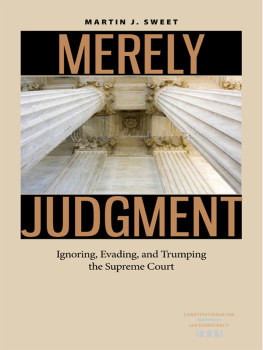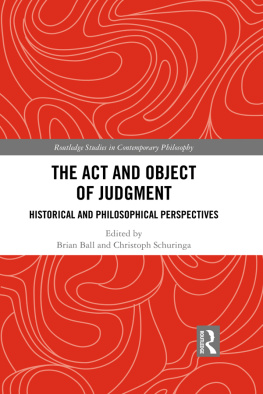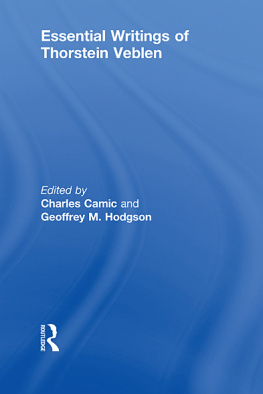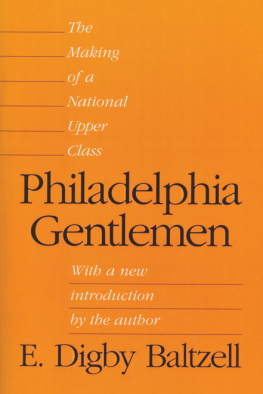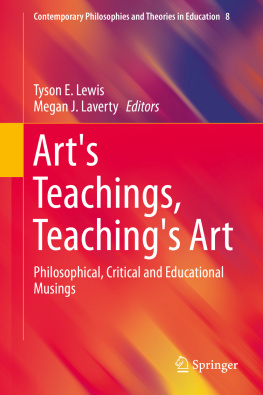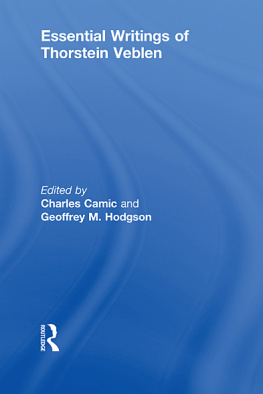First published 1994 by Transaction Publishers
Published 2017 by Routledge
2 Park Square, Milton Park, Abingdon, Oxon OX14 4RN
711 Third Avenue, New York, NY 10017, USA
Routledge is an imprint of the Taylor & Francis Group, an informa business
Copyright 1994 by Taylor & Francis
All rights reserved. No part of this book may be reprinted or reproduced or utilised in any form or by any electronic, mechanical, or other means, now known or hereafter invented, including photocopying and recording, or in any information storage or retrieval system, without permission in writing from the publishers.
Notice:
Product or corporate names may be trademarks or registered trademarks, and are used only for identification and explanation without intent to infringe.
Library of Congress Catalog Number: 93-41656
Library of Congress Cataloging-in-Publication Data
Baltzell, E. Digby (Edward Digby), 1915-
Judgment and sensibility : religion and stratification / E. Digby Baltzell ; edited and with an introduction by Howard G. Schneiderman.
p. cm.
Includes bibliographical references and index.
ISBN 1-56000-048-1
1. Social classesUnited States. 2. Upper classesUnited States. 3. Elite (Social sciences)United States. 4. WASPS (Persons)United States. I. Schneiderman, Howard G. II. Title.
HN90.S6B34 1994
305.520973dc20 93-41656
CIP
ISBN 13: 978-1-56000-048-8 (hbk)
Among the blessings of my life, I rate my intellectual and personal ties with a small number of former graduate students very near the top. The inner core of these students attended my graduate course in Social Organization at Penn during the academic years of 1970 and 1971, among them Howard Schneiderman who has been one of my closest friends ever since. For his untiring devotion in putting together two volumes of my writings, of which this is the second, I thank him with all my heart and with all my mind.
Introduction
Thoughts Out of Season
E. Digby Baltzell and the Protestant
Establishment
Howard G. Schneiderman
Judgment and Sensibility is the second volume of the collected essays of E. Digby Baltzell, one of the keenest observers and analysts of Americas upper classes since Thorstein Veblen. Spanning four decades of writing, these essays cover a wide range of topics, including contemporary politics, democratic elitism, Puritanism, Judaism, higher education, urbanization, and the U.S. Supreme Court, among others. As in The Protestant Establishment Revisited, the first volume of Baltzells papers, these subjects are observed and analyzed through the sociological lenses of class, status, power, and authority.
Underlying many of these essays is the idea that taking the lead, and setting the tone, in America is never easy. What makes the problem of leadership in America so difficult to resolve is that class, status, power, and authority, which are inextricably connected to leadership, tend also to violate the basic egalitarian ethos at the core of American culture. This fundamentally paradoxical relationship between hierarchy and equality is addressed in many different ways in the essays collected here, as it is in all of Baltzells writings.
Although the Protestant Establishment, about which Baltzell has written both admiringly and critically, is almost invisible in American political and cultural life today, it provided him with a virtual case study of how class and authority are intimately connected. For Baltzell, an open and authoritative establishment is a necessary and desirable part of the process of securing responsible leaders in a democratic society. This theme is woven into the fabric of the essays in this volume with both judgment and sensibility, and accounts for a certain thoughts out of season quality to the book because Baltzells ideas often go head to head against the prevailing academic anti-elitist conventional wisdom of our day.
Judgment and sensibility, however, imply no lack of passion, of which Baltzell has plenty. Witness the following from Blue-Blood Blues, one of the essays collected in this volume: Throughout most of this so-called Century of the Common Man, writes Baltzell, the subject of class in America has had much the same closed-closet status as masturbation and fornication: ladies and gentlemen simply did not talk about such things in mixed company or in public. Since the 60s, however, when every damned thing was dragged out of the closet, and ladylike and gentlemanly manners were dismissed as elitist, everybody has been free to talk about anything, anywhere at anytime, few suspecting that a world without closets might already be well on its way to barbarism. In this new climate of opinion, I should not have been taken by surprise when one of my students at Penn during the 70s came up to me after class and asked: Whats your class background professor? None of your business, my boy, I replied with a smile. Nor should I have been enraged as I watched Diane Sawyer rudely ask George Bush, in front of millions of TV viewers, to explain why people thought of him as a wimp. Had I been Bush, I would have kicked her, but Bush did his best to answer her patiently and politely.
The passion, and even anger, pouring forth from the above passage would surprise no one who knows Digby Baltzell and his work. A sociologist of the first order, Baltzell earned his Ph.D at Columbia University in 1952 after studying with Robert Merton, Paul Lazarsfeld, Robert Lynd, C. Wright Mills, and Robert Maclver among others during the mid- to late-1940s. Baltzell has demonstrated again and again in his work that understanding does not come from facts alone, but from a passionate involvement with them. In his private and personal life Baltzell is a kind and charming man, a very polite man, in a word, a gentleman. In his public and professional life as a noted sociologist and historian, however, Baltzell can be the intellectual equivalent of a tough street fighter, as evidenced in many of the essays collected here.
A member of the upper class himself, Baltzell has carved out a reputation as a wasp with a sting, But things were not always as such.
At its height, according to Baltzell, the Protestant Establishment, dominated by a group of wealthy and powerful consanguine families of old-stock, white, Anglo-Saxon Protestants, or as they are now generally called, wasps, provided the nation with an authoritative core of important and influential leaders. These old-stock wasp families exercised national authority in the presidency, as well as the cabinet, in diplomatic circles, and in other governmental jobs. They took the lead in legal and juridical roles, and as heads of important corporations, banks, investment houses, and other commercial interests, not to mention churches and colleges throughout America. In short, they set the tone for American political, business, and cultural life. As such, wasps were less an ethnic group than a high-status group. The Protestant Establishments power and authority, as well as its social class and status, rather than its ethnicity, were driving forces in American history and contemporary society. Yet it must be said, and I think that Baltzell would agree, that the Protestant Establishment is now all but gone from the American scene; or as Robert C. Christopher, the author of Crashing the Gates: The De-Wasping of Americas Power Elite, says relatively few members of the national social aristocracy have made truly major contributions to the political or economic development of the United States in the last four decades.


